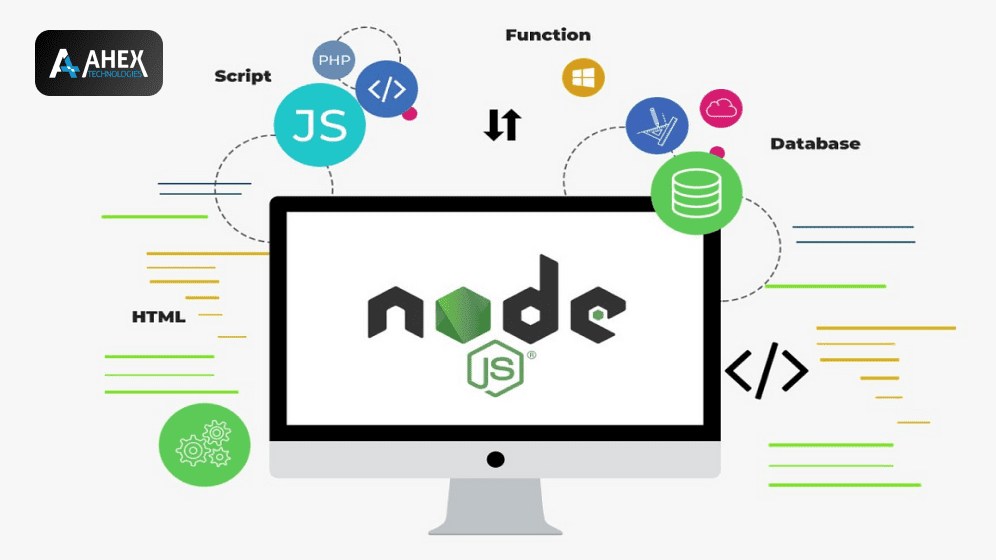
Are You Looking Node.JS empowering web development Digital Era? The world of web development has been rapidly evolving, and in the digital era, staying ahead of the game is crucial for industry leaders. With the increasing demand for fast, scalable, and efficient web applications, developers are constantly seeking new technologies that can empower them to build cutting-edge solutions. One such technology that hasNode.js gained significant popularity in recent years is Node.js.
What is Node.js?
Node.js is an open-source, JavaScript runtime built on Chrome’s V8 JavaScript engine. It allows developers to run JavaScript code on the server-side, enabling server-side scripting and development of highly scalable network applications. Node.js was created by Ryan Dahl in 2009 and has since become a prominent tool for modern web development.
Advantages of Node.js
Node.js offers several advantages that make it a preferred choice for web development:
- Scalability: Node.js is known for its event-driven, non-blocking I/O model, which makes it highly scalable and capable of handling a large number of concurrent connections.
- Speed: Node.js leverages V8 JavaScript engine, which compiles JavaScript code into machine code, resulting in faster performance compared to traditional interpreted languages.
- Real-time Applications: Node.js is ideal for building real-time applications, such as chat applications, gaming servers, and collaborative tools, as it allows for bidirectional communication between the server and the client using WebSockets.
- Easy to Learn and Use: Node.js uses JavaScript, a popular and widely used programming language, making it easy for developers to learn and use, especially for those with prior experience in JavaScript.
- Large Community and Ecosystem: Node.js has a large and active community of developers, which means abundant resources, libraries, and tools are available to streamline the development process.
Use Cases of Node.js
Node.js has been successfully used in various industries and for different use cases. Some of the common use cases of Node.js include:
1. Web Applications
Node.js is widely used for building web applications, ranging from simple websites to complex web applications with multiple features and functionalities. Its non-blocking I/O model and fast performance make it suitable for handling heavy web traffic and concurrent connections.
2. APIs
Node.js is also commonly used for building APIs (Application Programming Interfaces) that allow different applications to communicate with each other. Its event-driven architecture and lightweight nature make it a popular choice for building scalable and efficient APIs.
3. Real-time Applications
As mentioned earlier, Node.js is well-suited for building real-time applications that require instant data exchange between the server and the client. Examples of real-time applications built using Node.js include chat applications, online gaming servers, and collaborative tools.
4. Microservices
Node.js is often used for building microservices, which are small, independently deployable components of an application that work together to provide the overall functionality of the application. Node.js’s lightweight nature and event-driven architecture make it a good fit for building microservices-based architectures.
Node.js for Industry Leaders
In today’s fast-paced digital world, industry leaders require technology that can keep up with their growing demands and enable them to stay ahead of the competition. Node.js has emerged as a powerful tool for industry leaders, providing them with a competitive edge in web development.
One of the key reasons why Node.js is favored by industry leaders is its ability to handle a large number of concurrent connections and high traffic loads. This makes it ideal for building applications that need to serve a large user base, such as e-commerce websites, social media platforms, and content delivery networks. Node.js’s event-driven, non-blocking I/O model allows for efficient handling of incoming requests, resulting in faster response times and improved user experience.
Another advantage of Node.js for industry leaders is its scalability. As businesses grow and evolve, their web applications need to scale accordingly to accommodate increased traffic and user demands. Node.js’s architecture allows for horizontal scaling, where multiple instances of the application can be run simultaneously to handle the load. This makes it easier for industry leaders to scale their web applications as needed, without experiencing downtime or performance issues.
Furthermore, Node.js’s real-time capabilities make it a valuable asset for industry leaders. Real-time applications, such as chat applications, online collaboration tools, and online gaming servers, require instant data exchange between the server and the client. Node.js’s event-driven architecture and support for Web Sockets enable real-time communication, providing seamless and interactive user experiences.
How Node.js Empowers Web Development
Node.js empowers web development in several ways, making it a preferred choice for industry leaders. Here are some ways in which Node.js empowers web development:
1. Faster Development Cycle
Node.js’s use of JavaScript for both server-side and client-side development allows for a unified development environment. This means that developers can write code in a single language throughout the entire development cycle, reducing the need to switch between different programming languages or frameworks. This results in a faster development cycle, as developers can reuse code and easily transition between front-end and back-end development tasks.
2. Rich Ecosystem of Libraries and Tools
Node.js has a large and active community of developers, which has resulted in a rich ecosystem of libraries and tools. This makes it easy for developers to find and use existing libraries and tools for common tasks, such as handling HTTP requests, working with databases, and implementing authentication and authorization. This extensive ecosystem accelerates the development process and allows industry leaders to leverage the collective knowledge and expertise of the Node.js community.
3. Increased Productivity
Node.js’s non-blocking I/O model and event-driven architecture enable developers to write scalable and efficient code that can handle concurrent connections and high traffic loads. This results in improved performance and faster response times, allowing industry leaders to deliver high-quality web applications to their users. Additionally, Node.js’s use of JavaScript allows for code reusability and modularization, increasing productivity and making it easier to maintain and update web applications.
4. Flexibility and Scalability
Node.js’s architecture allows for easy scaling of web applications, making it flexible and adaptable to changing business needs. It can handle horizontal scaling, where multiple instances of the application can be run simultaneously, or vertical scaling, where the application can be run on more powerful hardware. This flexibility and scalability make Node.js a preferred choice for industry leaders who need to accommodate varying levels of traffic and user demands.
5. Enhanced Performance
Node.js’s use of V8 JavaScript engine, which compiles JavaScript code into machine code, results in faster performance compared to traditional interpreted languages. This allows web applications built with Node.js to handle a large number of concurrent connections and process requests quickly, resulting in improved performance and better user experience. The non-blocking I/O model also ensures that the application remains responsive even during high traffic loads, making it ideal for industry leaders who need to deliver reliable and high-performing web applications to their users.
6. Support for Microservices Architecture
Node.js’s lightweight and modular nature make it well-suited for building microservices-based architectures. Microservices architecture is a software development approach where applications are broken down into small, loosely-coupled services that can be developed, deployed, and scaled independently. Node.js’s ability to handle concurrent connections and its event-driven, non-blocking I/O model make it a perfect fit for building microservices-based applications, allowing industry leaders to develop scalable and maintainable systems.
7. Community Support and Updates
Node.js has a large and active community of developers who contribute to its development and regularly release updates and improvements. This ensures that Node.js remains up-to-date with the latest web development trends and technologies, providing industry leaders with access to cutting-edge features and improvements. The community support also means that there are ample resources available, including documentation, tutorials, and forums, which make it easier for developers to learn and adopt Node.js for web development projects.
8. Cross-platform Compatibility
Node.js is built on the V8 JavaScript engine and is compatible with various operating systems, including Windows, macOS, and Linux. This cross-platform compatibility allows industry leaders to develop web applications that can run on different environments without significant changes to the codebase. This makes Node.js a flexible and versatile choice for web development projects, enabling industry leaders to reach a wider audience with their web applications.
Conclusion
In the digital era, web development is a critical aspect for industry leaders to stay competitive and meet the growing demands of their users. Node.js has emerged as a powerful tool that empowers web development by providing faster development cycles, a rich ecosystem of libraries and tools, increased productivity, flexibility and scalability, enhanced performance, support for microservices architecture, community support and updates, and cross-platform compatibility. With its unique features and advantages, Node.js is a preferred choice for industry leaders who seek to build robust, scalable, and high-performing web applications. You can Check NodeJs development Service. and Angular development.
FAQs
No, Node.js can be used for applications of all sizes, from small to large-scale projects.
Yes, Node.js can be used for both front-end and back-end development, allowing for a unified development environment.
Yes, Node.js is built on JavaScript, so a good understanding of JavaScript is necessary for effective development using Node.js.
Node.js can have a learning curve for beginners, but with resources like documentation, tutorials, and forums, it can be learned effectively.
Yes, Node.js is versatile and can be used for various types of web applications, including e-commerce, social media, content delivery networks, real-time applications, and more.
In conclusion, Node.js has become a powerful tool for industry leaders in the digital era, providing numerous benefits and advantages for web development. Its unique features, scalability, performance, and community support make it a preferred choice for building robust and high-performing web applications. Whether it’s for large-scale applications or small projects, Node.js empowers industry leaders to stay competitive and deliver cutting-edge web solutions to their users. So, take advantage of Node.js and unlock the full potential of web development in the digital era.







